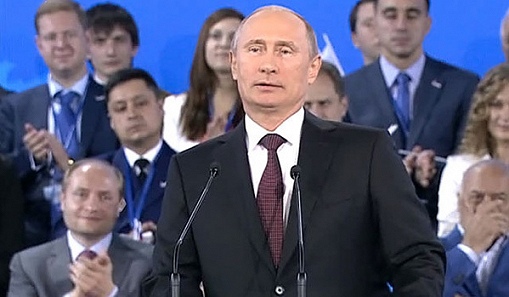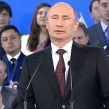
Russian Economy Stagnates and Simulates Success on the Wane of Putin’s Watch
Publication: Eurasia Daily Monitor Volume: 10 Issue: 119
By:

The annual St. Petersburg economic forum provided for President Vladimir Putin a perfect retreat from the deadlocked debates on negotiating a ‘political solution’ for the civil war in Syria as well as from the US President Barack Obama’s persistent – and, from the Kremlin’s point of view, entirely nonsensical – initiatives on reducing strategic arsenals. Putin had very little to say on the economic agenda of the G8 summit in Lough Erne, Northern Ireland last week, but the plenaries and roundtables in St. Petersburg were scripted according to his preferences – and were supposed to demonstrate the healthy dynamism of Russia’s economy (https://expert.ru/2013/06/21/vse-radi-rosta/). German Chancellor Angela Merkel came as the guest of honor, and Putin was at his networking best courting Western investors, but the Russian stock market greeted the opening of the forum by reaching a new yearly low (https://www.ng.ru/economics/2013-06-21/1_spb_forum.html). Asserting the firm stability of his economic course, Putin cannot accept the conclusion that it is the three key features of this policy – rigid central control, shameless corruption, and lack of the rule of law – that determine the declining growth.
The escalating inefficiency of central control was illuminated by the sharp disagreements at the forum between key ministers in Prime Minster Dmitri Medvedev’s cabinet on the proposition to devaluate the ruble in order to stimulate the economy (https://www.kommersant.ru/doc/2216432). The slowdown is impossible to deny, and Putin had to concede that the ‘magic wand’ of expanding energy revenues had gone for good, but he was loath to admit that his efforts to conjure growth by wielding an administrative stick had yielded no fruit (https://www.gazeta.ru/business/2013/06/21/5389501.shtml). Seeking to give a boost to re-industrialization, he has instructed to limit the increase of tariffs on gas and electricity by the benchmark of inflation, much to the chagrin of Gazprom, which was barely present at the gala of rent-harvesters (https://www.vedomosti.ru/politics/news/13377221/putin_rost_tarifov_monopolij_ogranichat_na_5_let). It was Igor Sechin, the chief of Rosneft and Putin’s trusted minion, who basked in media attention and elaborated on the idea of setting a committee of international energy ‘majors’, while his every achievement only exacerbated the government’s weakness in regulating the activity of overgrown state corporations (https://www.rbcdaily.ru/tek/562949987494423).
The dominance of these ‘champions’ squeezes out medium and small business and also provides fertile ground for corruption, and while presently it is the Sochi Olympics that leads in squandering the budget, the mega-projects announced by Putin in St. Petersburg, including the high-speed railroad from Moscow to Kazan, could re-write this record (https://lenta.ru/news/2013/06/21/invest/). It is the Russian Railways Corporation that stands to profit nicely from this project, and it is the boss of this state-owned company Vladimir Yakunin who unwillingly created the major sensation of the St. Petersburg forum, when the breaking news on his dismissal was announced by the official information agencies before being recalled as bogus within an hour (https://www.polit.ru/article/2013/06/21/yakunin/). What made that perfectly-forged decree instantly believable was the information about Yakunin’s opulent dacha-palace outside Moscow that was published by blogger Aleksei Navalny in early June and which is yet to be officially disproved (https://www.gazeta.ru/politics/2013/06/19_a_5386925.shtml; https://navalny.ru/blog/1202/).
Corruption is perhaps the main spoiler of the investment climate but what makes it truly unbearable for many Russian investors who keep taking their liquid assets out of the country is the complete lack of legal protection of their business. Sergei Guriev, an exiled Russian economist, argues that high-level pledges to ensure the safety of investments amount to false pretenses as long as the rule of law continues to deteriorate (https://www.newsru.com/finance/21jun2013/guriev.html). Russia’s status of anti-Rechtsstaat has found a new confirmation in the US State Department report on human trafficking, which established that the exploitation of hundreds of thousands of Gastarbeiter from Central Asia was equal to the use of slave labor, prompting the Russian Foreign Ministry to contemplate an ‘adequate response’ to this ‘unfriendly step’ (https://www.ng.ru/world/2013-06-21/8_slavery.html). The abuse of police power is certainly not limited to the economic sphere, and the brutal eviction of the NGO For Human Rights from its office in Moscow last Friday night makes just another example of the deliberately increasing pressure on the opposition (https://www.mk.ru/social/article/2013/06/22/873111-ponomarev-o-vzyatii-ofisa-dvizheniya-quotza-prava-chelovekaquot-quotu-mitrohina-rassechena-nogaquot.html).
The business glitterati that flocked to St. Petersburg to show loyalty to the irritable boss are by no means blind to the incurable ills, which condemn the Russian economy to declining growth, and they are aware of the risks associated with crossing the fast-approaching line between stagnation and recession. Their insight into the chaotic economic decision-making in the Kremlin makes them wiser about the intensity of clan feuds, so few are prepared to believe that the news about Yakunin’s demise was produced by a hacker prank (https://grani.ru/opinion/portnikov/m.215931.html). The rich and powerful have grown weary with Putin’s obsession with control, and they know that he has no reason to trust any of them, so nobody in the ‘inner circle’ is safe against an outburst of supreme arbiter’s anger or a calculated decision to sacrifice a cadre liability (https://echo.msk.ru/programs/code/1100044-echo/). For that matter, Putin’s dubious initiative on merging the Supreme Court and the Supreme Commercial Court was interpreted as creating a position for Medvedev who is expected to be removed from the too powerful role of prime minister (https://www.kommersant.ru/doc/2218322).
Putin has no understanding of the complex balances of market economy, but he is frustrated in the progressively poorer performance of the simpler mechanisms of centrally-controlled economy. He is confused by the contradictory advice of aids and cannot rely anymore on the judgment of Aleksei Kudrin, and so suspects that the notorious ‘invisible hand’ of the market is in fact a sum of the hands of his closest comrades, who are busy filling their pockets from the shrinking state coffers. He sees the rationale for getting rid of the most ambitious of the ‘loyalists’, like Yakunin, but fears to provoke their defection or to trigger their survival instincts, while they become both unnerved by his angst and emboldened by his clinging to the past. The scheme in which he rules over the court and the courtiers rule over the economy, does not work in the contraction phase, but he is stuck with it – and they are comparing options.




